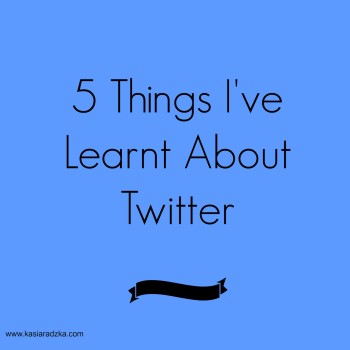
by Kasia | Jul 19, 2015 | Self Promotion, Writing
 Social media is a foreign language that I’m only slowly learning to grasp. It took me a few years to be comfortable with Facebook, and even now I still have second thoughts at times when I go to post something but I’m getting over it. Twitter, well I only started using it seriously last month. That’s right, I’ve been active on Twitter for about four weeks and I am surprised by the results. I still have a lot to learn but here are five things I’ve learned about Twitter so far.
Social media is a foreign language that I’m only slowly learning to grasp. It took me a few years to be comfortable with Facebook, and even now I still have second thoughts at times when I go to post something but I’m getting over it. Twitter, well I only started using it seriously last month. That’s right, I’ve been active on Twitter for about four weeks and I am surprised by the results. I still have a lot to learn but here are five things I’ve learned about Twitter so far.
1 – Twitter is about everyone else
Social media has made us into narcissists. There’s no doubt denying it. We are celebrities in our own little world. We want recognition, we want praise, we want success. There’s nothing wrong with that. A healthy dose of narcissism can be the difference between failure and success. Too much and you start getting on people’s nerves. Twitter isn’t about you, ok maybe a little, but it’s not there for you to scream “BUY MY BOOK!”, “BUY MY GODDAM BOOK ALREADY!”.
What in the world are you supposed to do instead?
That question plagued my mind for weeks. What in the world am I going to tweet about? (Yes, tweet is a verb and not just the chirping type) I’m not funny, I”m not cool, and I’m still so inept when it comes to social media.
Turns out I had nothing to worry about at all. ‘Just retweet other posts’ a friend told me. Sounds easy enough. I find something I like, and I retweet.
Easy.
Twitter is about promoting others. The good thing with promoting others is that social karma will come back your way. Someone eventually, if your work is good enough, will promote you too. Retweeting is a good start until you figure out the ropes, then slowly but surely your tweeting confidence shall grow.
2 – Twitter is more effective than Facebook
Facebook has been losing its shit for a while now. You put up a post but it only reaches fifty people? What the? Unless you pay for a page, Facebook seems to hide your stream from your fans. Why is that? It’s all business, isn’t it?
With Twitter, there’s a constant traffic going on. You get your notifications, your tweets and you can see everything that’s going on. It’s also so much easier to get followers. When I started on Twitter four weeks ago, I had 9 followers. Yes, 9. That number made me feel deflated. What was I doing wrong? Four weeks later I’ve reached 300. I’ve been on Facebook for six months and there are 113. What am I doing wrong there?
3 – You can say a lot in 140 characters or less
At first glance 140 characters doesn’t seem like much but it’s enough to get your message across. You can tease your reader with a sentence from your novel. I’ve seen a lot of romance/erotica type teasers on Twitter. Quotes are popular, motivational quotes are great for writers as we often procrastinate, self-criticise and make excuses when the words don’t come. Twitter also teaches us to omit useless words. Write tightly: on Twitter and in your fiction and non-fiction works.
4 – There are a lot of writers out there
Writing is mostly a solitary activity. Having a community to share your thoughts, struggles, hopes, dreams and setbacks, makes being a writer easier and less lonely. Thanks to Twitter I’m finding writers from around the globe who are either in the same boat as I, ten steps ahead or a couple behind. It’s nice to know that we can help one another whether it’d be from a quick tweet, a short message, some moral support, or reaching out for an interview or advice. I’m looking forward to getting to know some of the writers I’ve started following.
5 – You only need 10 minutes a day
Time is of the essence, especially when you’re combining writing with full or part time work, commuting, parenthood, home duties, family and friends and all the other responsibilities that plague our day. Making room for social media may not be at the top of your priority list. It definitely is not on mine. But I’ve found that 10 minutes a day can make all the difference. We can all find 10 minutes. I use my time on the train for writing and social media. It’s a little bit everyday that will make all the difference to your career. And because it’s only 10 minutes it’s structured, focused and not time wasteful. I went from 9 to 300+ followers in four weeks by spending about 10 minutes per day on Twitter. Imagine what might happen in four months?
Twitter is still foreign to me. I still grapple with confidence on what to tweet, what to retweet, who to connect with, who to reach out to, and how much self promotion to do. Balance is key. I won’t be shouting buy my book unless there’s a promotion going on, but I will be reading and observing what others are doing, feeling grateful that there’s a community out there, and hoping that someone somewhere will pick up my book, enjoy it, and be willing to promote it. Until then, I’m going to go back to writing and reading more novels, and yes, tweeting about them too.
Do you use Twitter? What do you love and hate about it? Any words of wisdom?

by Kasia | Jul 17, 2015 | Reading, Self Publishing, Writing
 It’s been a busy week. A cold week. The Gold Coast felt the cold snap with temperatures reaching 5C in the early morning. Ok, so it’s not as cold as some parts of the world but when you’re used to winter temperature hovering around 10C-15C anything less and you’re feeling frostbite on your fingers and toes.
It’s been a busy week. A cold week. The Gold Coast felt the cold snap with temperatures reaching 5C in the early morning. Ok, so it’s not as cold as some parts of the world but when you’re used to winter temperature hovering around 10C-15C anything less and you’re feeling frostbite on your fingers and toes.
There’s been lots going on in the world wide web. Here are just a few articles for some weekend reading if you’re interested. Writing, motivation, marketing and more.
Why Smart People Don’t Quit on Horkey Handbook. Gina’s blog is awesome and she always has useful information for freelancers and writers in general. I think this one is a worthy reading for anyone considering quitting their dream.
How To Be A Freelancer While Working Full Time on Fulltime Nomad. There’s some great advice there for anyone trying to juggle freelancing and full time work.
Marketing Advice from a Publishing Pro: Jane Friedman Shares Her Best Tips on Social Media Just for Writers. This one is about a year old but I stumbled on it in search of marketing advice for authors. There’s a wealth of information out there and this one is a worthwhile read.
7 Things Writers Should Stop Wasting Their Time On at Carly Watters. Literally Agent. Procrastination comes with the writing territory and there are some things writers can’t help themselves with. Here are are seven that we probably should give a rest. I know number 3 held me back for years.
How Freelance Article Writers Can Find Facts Fast – And Make Sure They’re True on Make A Living Writing. You want credibility as a freelance writer and that means getting your facts straight. The article gives you the basics and a good place to start when you’re researching your article.
Have you seen anything interesting around the online community? Share it in the comments!
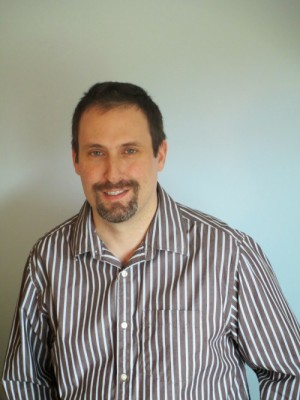
by Kasia | Jul 12, 2015 | Writing
Welcome to the series, Sunday Sessions, where you’ll get to meet authors from around the world, writing in different genres, sharing their writing tips, marketing adventures and much more.
Please welcome Matthew Peters, American author of ‘The Brothers’ Keepers’. A story of murder and intrigue, and the lengths some will go to ensure a secret remains buried forever.

1 – Tell us a bit about yourself?
I’m a transplanted Yankee living in North Carolina. I have a Ph.D. in political science from Duke University, which I hesitate to say because academics are often notoriously bad writers. I hope I’m an exception to that rule. I’ve taught courses in political science, history, sociology, and markets & management. I’ve been writing full-time for the past few years. When I’m not writing, I’m reading and/or thinking about writing. I hope to continue writing genre and literary fiction.
2 – How did the idea for The Brothers’ Keepers come about?
The idea for The Brothers’ Keepers came about by playing the what-if game. I began with the following: What if a document written by Jesus was discovered? What would the contents of the document be? Who would have such a document? Who would know about the existence of such a document, and what would the struggle to get a hold of it look like? This was the initial question that inspired the novel. This initial question underwent several versions over the course of the research, but that is how the idea came about.
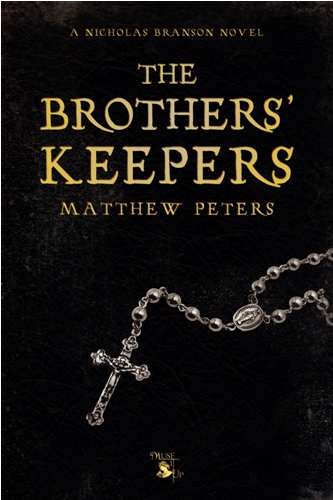
3 – What sort of research did you do before you started writing?
First, I had to master a good deal of history, both of the early Christian Church and the subsequent sects that developed out of the Roman Church. Second, I had to familiarize myself with scripture, not just the Bible but also books excluded from the canon. Third, I had to describe places I’ve never been, so I read travelogues and “visited” various places through YouTube and Google Earth.
4 – What do you love/hate most about writing or being a writer?
I love the research part of the writing process, and hearing from my readers. I hate the marketing/promoting part.
5 – What is your typical writing day like?
That really depends on what part of the process I’m working on. My process breaks down into three major components: 1) research; 2) writing; and 3) revising. The Branson books are research-intensive. I spend more time researching and developing the plot than I do writing them. When I’m researching, I do it for about ten to twelve hours a day, at least five days a week. This can take several months. When I have basically finished researching and am to the point of writing, I write from about 4:00 AM up until mid-morning. I never write new material after noon. Once I’ve completed a draft, I revise during the mornings and afternoons until I have a manuscript ready for the eyes of my editors. All this time, I will have submitted chapters to my writing group.
6 – What are you currently reading?
Currently, I’m reading Fyodor Dostoevsky’s The Brothers Karamazov and Donald Maass’s Writing the Breakout Novel.
7 – If you were having a dinner party and could invite five people, living or dead, who would you invite and why?
First, I’d invite my mom because I love her and miss her. Second, I would invite the historical Jesus, which would help answer a lot of questions I have. The third person I’d invite would be Fyodor Dostoevsky due to his deep understanding of human psychology and the spirit. Fourth, I’d invite Nietzsche, because he’d be a riot and I’d love to see how he handled interacting with Jesus. Finally, I’d ask Scarlett Johansson, because…well, just because ☺
8 – What’s your view on social media marketing for authors?
My view and experience has been that social media marketing is not very effective, though obviously you need some presence on sites like Facebook and Twitter.
9 – Do you have any marketing tips for new authors?
The best marketing tip I can offer is to try Bookbub. I haven’t tried it yet, but from what I hear the results can be very good.
10 – If your book was turned into a film, who would you like to play your main characters? The villain?
I would have so much fun casting the main characters in a Hollywood adaptation of The Brothers’ Keepers! Quite honestly, I’ve given considerable thought to this issue (I mean, and what writer hasn’t?), and, in consultation with my significant other, have reached the following conclusions.
First, to the all-important question of who would play Nicholas Branson, the answer is Hugh Jackman. Why, you might ask? Well, the role of Nicholas Branson needs to be cast with an eye toward a mature actor, one who can credibly combine Branson’s high intellect with his alcoholism and a somewhat stilted emotional maturation. The role is sometimes physically demanding, so we’d need someone in very good shape, for which Mr. Jackman fits the bill.
In addition, many times while watching a thriller I’ve wanted the main character to bust out a tune, and, if you’ve seen Les Misérables, you know Hugh can do it. Sorry, I couldn’t resist. But the most important reason to cast Jackman as the lead male protagonist is because my girlfriend told me I had to ☹ You might ask why I just didn’t start out by saying this, thereby saving us all some time. I could have, but then you would’ve missed out on all the fun.
When it comes to casting the lead female role, Jessica Jones, I have to go with Scarlett Johansson. Why Scarlett? Because of her range, her versatility, her instincts, her…ahem, well, let’s just leave it at that. But I think Ms. Johansson has the necessary spark and wittiness to play the part. The final reason is that if my girlfriend gets Hugh, I get Scarlett.
Oh, and that ability to burst out in song? Well, our Scarlett is no stranger to the musical scene. In fact, if you’ve never heard her sing, do check out her debut studio album, Anywhere I Lay My Head. But let’s face facts for a minute. Even if Scarlett couldn’t carry a tune though her hand was dipped in paste, who really cares? She’s perfect for the role of Jessica Jones, and once you read the book you’ll see why.
I can’t cast too many more actors without spoiling the plot, but there is one other person who plays a rather large part in the story—the wicked, formidable cardinal, Dottrina. When casting a villain is there any other choice but Alan Rickman? And just in case you’re wondering about the prospects for a sing-off with the protagonists, just watch Sweeney Todd, and you’ll see that Alan is more than simply Severus Snape or Hans Gruber: he’s a villain with a voice. Plus, he’s the one person on whom my girlfriend and I agree. And that, of course, is the clincher.
As you can see, I’ve given very little thought to this question 😉
11 – Where is your favourite place to write? Why?
My favorite place to write is the only place I can write. And that is on my desktop computer in my office. Why? Because I have all the sources I may need at my fingertips.
12 – What advice would you give to aspiring writers?
Read, read, read. Read the classics and as much good literature as you can get your hands on. Read widely, too, from poetry and plays to science and politics. If you don’t read well, you can’t write well.
Get bad writing out of your system…by writing. You may have several stories or even novels in you that you must write in order to get them out of your system. In some cases, these will not be salable. That’s okay. Most of us have a lot of bad writing inside of us that needs to get out before we get to the good stuff.
Don’t be a perfectionist. Perfectionism kills. Realize that unlike other professions, say neurosurgery, writers don’t have to get it right the first time. We have the luxury of being able to revise our product as much as we wish. Realize that, and let it free you up in the writing process.
The first draft stinks…but write it anyway. Anne Lamott talks a lot about the shitty first draft. (If you don’t know who Anne Lamott is, check out her book Bird by Bird). Indeed. But that’s okay. Give yourself permission to write lousy first (second and third) drafts. They’ll improve in revisions.
It’s okay not to be in love with writing every second of every day. It’s natural to resent it at times. Don’t stuff these feelings, and don’t be afraid to vent them. Writing is not all sunsets and rainbows. Any writer who is really working will understand your frustration.
Join a writing group. Make sure others read and give you feedback on your writing. Make sure someone other than your parents or significant other reads your work. But also be wary of taking too much constructive criticism from too many people, especially too early in the story writing process—too many writers can spoil the plot (among other things).
Don’t be overly eager to submit to an agent, or a publisher. Before you submit your work , make sure it is free from typos, grammatical, and factual errors. If you can afford it, have a content editor and a copy editor go through your work and polish it until it shines. Don’t submit anything for publication until it represents your absolute, best effort. I think you’ll be surprised how much that will distinguish you from the slush pile. Save your perfectionistic tendencies for the final draft. You’ll be glad you did.
A word on marketing. Realize that when you get published, nine times out of ten, the marketing will fall on your shoulders. Be prepared for this. Start building a readership as early as you can. Social media (e.g., Twitter followers, a Facebook page, a website, etc.) is a good venue for this.
Always strive to improve. Constantly hone your craft by taking courses, going to workshops/conferences, and by reading books on writing. Too many times, I’ve seen writers who think they know it all stop learning. These are often the same writers who refuse to get feedback on their work. Don’t fall into this trap. Hemingway said, “We are all apprentices in a craft where no one ever becomes a master.”
And, finally: Set a modest word count. Avoid setting unrealizable goals, and thereby setting yourself up for failure. I shoot for 500 words a day on the days I write. That’s two pages a day, ten pages a week (taking weekends—or any other two days—off). This may not sound like a lot, but in a year, I have 480 pages, a good-sized novel. Slow and steady often wins the race.
13 – What’s next for you?
Currently, I’m working on the second novel in the Nicholas Branson series. I hope to have that out sometime next year, the earlier the better.
Please share your social media/sales links:
Website: http://www.matthewpetersbooks.com/
Facebook: https://www.facebook.com/pages/Matthew-Peters-Author/1434941676798108
Twitter: https://twitter.com/MatthewPeters65
Amazon: http://www.amazon.com/Matthew-Peters/e/B00MRSLIRC/ref=dp_byline_cont_ebooks_1
GoodReads: https://www.goodreads.com/author/show/2100705.Matthew_Peters
Matthew, thank you so much for speaking to us!
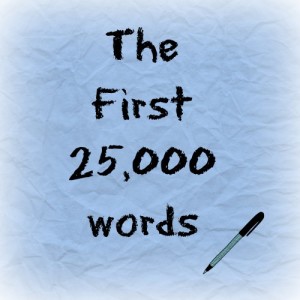
by Kasia | Jul 10, 2015 | Writing
 I know what I want to say, I just can’t find the words to say it. Do you ever feel that way?
I know what I want to say, I just can’t find the words to say it. Do you ever feel that way?
The 25,000 word mark or thereabouts is where I tend to get stuck.
The beginning is done, the story is more or less set, and the dreaded middle arrives. I should be pumped to have gotten this far, now I just have to pull the story along. But instead of writing, I’m staring at a blank page searching for the words, the scenes, the characters to come to life, the action to keep me interested.
There’s nothing.
I think I need to throw in an explosion, a murder, or a red herring of some sort to move the story along. Every idea that pops to mind seems ridiculous.
This is the moment where all self doubt seems to cloud my judgement. There’s no such thing as perfect, good enough is well, good enough. I can always fix it up in a later draft. I just need to keep going and that means writing, even if it’s shit. Didn’t Hemingway say, you gotta write shitty first drafts first?
I’m not sure shitty is the way to go but if it will take the pressure off, why not? You can always omit the crap once it’s on the page, at least there’ll be something to work with.
The only option is to keep going.
Originally, I had given myself a deadline to finish the first draft of my next novel, a sequel to Lethal Disposal, by the end of July.
That leaves me with 21 days.
Hmm, if that’s not pressure, I don’t know what is. I’d have to average about 2500 words per day to get that done and while it’s certainly achievable, when you have to consider a day job, a toddler, a husband, a house to take care of, study, and sleep. The available writing hours definitely start dwindling away.
I don’t want to change the deadline because if I put too far in the future I might just get a little lazy. But I don’t want to put too much pressure on myself as that might cause the dreaded writer’s block.
I’m going to have an ‘A’ goal and a ‘B’ goal.
My ‘A’ goal is to finish the draft by the end of July and my ‘B’ goal is to shoot for mid August. Regardless, the first draft will be done.
So what am I still doing here? Time to get back to that novel!
How’s your writing going? Where do you get particularly stuck when writing your novel?
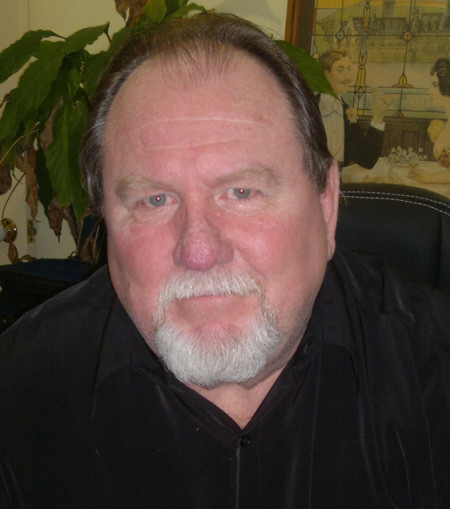
by Kasia | Jul 5, 2015 | Writing
Welcome to the new series, Sunday Sessions, where you’ll get to meet authors from around the world, writing in different genres, sharing their writing tips, marketing adventures and much more.
Please welcome Russell J. Perry, Australian author of ‘The Returning’ series. A story of reincarnation and mystery set in beautiful North Queensland, Australia.

1 – Tell us a bit about yourself?
I was born in Innisfail, North Queensland, but have lived in Brisbane for over 30 years. As a young child my Mother always read to my siblings and me and as we grew older she encouraged us to read for ourselves. I became an avid reader, always in search of a good story, but it wasn’t until much later in life that I started writing my own. In 2011 I finally made the time to write my first novel, “The Returning”. Writing is now a great passion in my life and I long to be able to concentrate solely on my art, without the need to work at my day job, (Marketing). I get closer to that goal with every chapter.
2 – How did the idea for The Returning Series come about?
“The Returning” is a story about reincarnation. A few years ago I had a strange dream, which, on waking, I remembered vividly. In the dream I seemed to be someone else, in another time. I wrote it down with the purpose of perhaps using it in a future story. I finally applied the “What If?” principle to the dream and “The Returning” was born, with the dream making an appearance in the second chapter. When I finished the first novel, the characters begged to be let out for another run, so I wrote the sequel, “Murdering Point.”
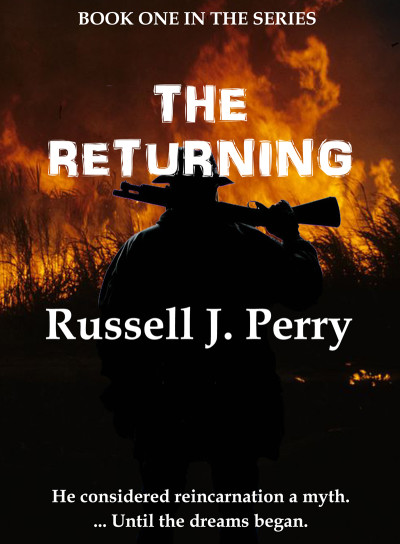
3 – What sort of research did you do before you started writing?
I researched reincarnation beliefs and reported incidences, as well as work done by Dr. Ian Stevenson on the subject. Most of my sources and videos on the subject are on my website. My Mother is also a medium of sorts, practicing “Automatic Writing” for many years. I got some insights from her experiences as well.
4 – What do you love/hate most about writing or being a writer?
I can’t think of one aspect of writing or story telling I hate. I am passionate about every part of the process. Plotting, writing, editing, re-writing and marketing. I think I was born to be an indi-author; I even make my own covers. I know I should get professional help, but finances are a barrier and I’m determined to hone my skills in all aspects, until I am a professional.
5 – What is your typical writing day like?
It starts at night before I fall asleep. I go over the story line in my head, thinking of the best way to move forward, until I fall asleep. As soon as I wake I make a coffee and go to the keyboard. I read and edit the last pages I wrote, so as to get me back into the story. I then write for about two hours then stop for breakfast. Most of my best inspiration comes in those two hours. I write after breakfast until lunch, and then I will probably break for a couple of hours. I will then put in another couple of hours in the afternoon, but this is about half as productive as the morning session. I normally top and tail each day with social media and website activity.
6 – What are you currently reading?
“The Persimmon Tree” – Bryce Courtenay.
7 – If you were having a dinner party and could invite five people, living or dead, who would you invite and why?
Bryce Courtenay – For his insights into writing and marketing. (I once had dinner with him when we were both in marketing. I didn’t know he was a writer then).
Samuel Clemens (Mark Twain) – To bask in his free spiritedness (I guess it’s a word, spell check seems to think so).
Steven Spielberg – To pick his brains regarding how he recognises a story worth telling.
Eddie Murphy – For his brilliant humour.
Jimmy Barnes – I will need someone to drink and sing songs with as the night wears on.
8 – What’s your view on social media marketing for authors?
Yes you need to work social media to get your message out there. It should always be used as a means to get readers to your website, to generate interest in what you are doing; you need to be inventive to stand out in your genre. You will tend to build a community of writers around you easily enough, but if someone has a way to get to the reader community, I’m all ears.
9 – Do you have any marketing tips for new authors?
Don’t buy followers or likes, it might look good, but it’s a waste of time and money. You need genuine fans to create sales and you need to genuinely interact with readers if you want them to spread the word. Don’t be afraid to work your book and your writing into the conversation at every opportunity.
10 – If your book was turned into a film, who would you like to play your main characters? The villain?
Liam Hemsworth – Jacob / Dario
Phoebe Tonkin – Gabriella / Luisa
John Jarratt – John Spait (The Villain)
11 – Do you ever get writer’s block? How do you overcome it?
Not really, but sometimes I slow up a little. I go back to an old story or start planning a new one. It can be a short story or flash fiction (I call this coffee-long fiction), something I can share on my website.
12 – Where is your favourite place to write? Why?
I would love a quiet place by the sea, the water inspires me. But my office at home is where I’m most comfortable currently. With a garden outside my window … it’s quiet.
13 – What’s next for you?
I’m currently writing the third book in “The Returning” series.
I’m plotting a Sci-Fi serial to share on my website by episode.
Please share your social media links:
Website – http://russellperry.com.au/
Facebook – https://www.facebook.com/RussellPerryPublishing
Twitter: – https://twitter.com/russell_perry
Google+ – https://plus.google.com/+RussellPerry/posts/p/pub
Amazon: – http://bit.ly/Russell-Perry-at-Amazon
Russell, thank you so much for speaking to us!
by Kasia | Jun 26, 2015 | Writing
Here are some interesting and information articles from around the web on writing, marketing and selling books. Enjoy!
Eight Rules For Fiction Writing by Teddy Wayne
This one is a couple years old but the rules are very true. Have a read for a bit of a laugh.
Boost Your Creativity: 7 Ways to be Insanely Creative on Demand
As a writer, whether you’re into fiction, writing articles, poetry or blogging, creativity plays a significant role. Read Write to Done’s article to keep yours in check.
Writers: Ignore This Writing Advice. If You Want.
Does all writing advice make sense? Does it apply to you? The answers may just depend on what you’re writing at any given time. Have a read to get a different perspective on writing advice from Fiction University.
Here’s What the Six-Figure Writers Are Doing That You’re Not
Are you suffering from starving artist syndrome? Stop, just because you’re a writer doesn’t mean you have to earn peanuts.
How I Sold 978 Fiction Ebooks Per Day In 2014…(The Complete Breakdown)
Let’s admit it: We want people to read our work. Here’s some advice to make it happen.
An interview with thriller author Kasia Radzka
I had the pleasure of being interviewed by Matthew Peters, author of The Brothers’ Keepers recently. Jump on the link to have a read.
Have you read anything interesting this week?

 Social media is a foreign language that I’m only slowly learning to grasp. It took me a few years to be comfortable with Facebook, and even now I still have second thoughts at times when I go to post something but I’m getting over it. Twitter, well I only started using it seriously last month. That’s right, I’ve been active on Twitter for about four weeks and I am surprised by the results. I still have a lot to learn but here are five things I’ve learned about Twitter so far.
Social media is a foreign language that I’m only slowly learning to grasp. It took me a few years to be comfortable with Facebook, and even now I still have second thoughts at times when I go to post something but I’m getting over it. Twitter, well I only started using it seriously last month. That’s right, I’ve been active on Twitter for about four weeks and I am surprised by the results. I still have a lot to learn but here are five things I’ve learned about Twitter so far.





